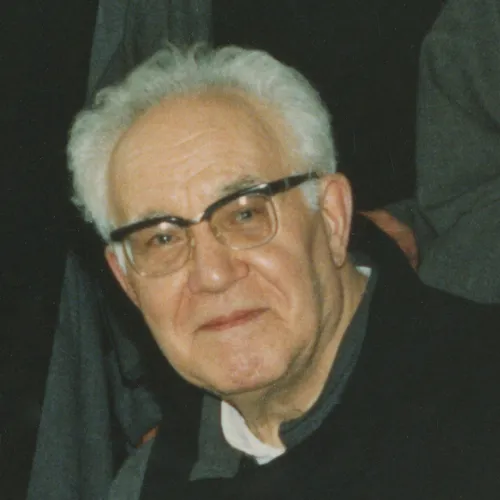Community of the Sons and Daughters of God
“We are the Community of the sons and daughters of God not because we live a life that takes us away from human interaction and relationships, from giving ourselves to them. No, it is just the opposite. We live in the Community because we want the Community to be a school of love for us, a school of prayer, a school of service.”
(Divo Barsotti)
The Community of the Sons and Daughters of God
A community of monks in the world
Who we are
The Community of the Sons and Daughters of God (the CFD – la comunità dei figli di Dio) is a “public association of the faithful” by decree of the Archbishop of Florence, Cardinal Silvano Piovanelli, January 6th, 1984.
Members live the mystery of adoption as God’s children (Gal,4:5, Eph,1:5, Rm,8:15+23) in the world according to monastic spiritual tradition.
Members don’t live in hermitages orin solitude, but as ‘monks in the world’,among peoplein life. They work as men and women of all ages in ordinary jobs, married or single. They are united in one family through one consecration, through which theygive and entrust themselves to the Eternal Word, to the Blessed Virgin, and to the Church.
History
When Father Divo Barsotti moved to Florence from the diocese of San Miniato in 1945, he was received by Cardinal Elia Dalla Costa (1872-1961) at the request of the politician and future Mayor of Florence, Servant of God Giorgio La Pira (1904-1977). He stayed in a convent near the Porta Romana. Four laywomen, already strongly united in faith, asked Don Divo to be their spiritual director. He devised a rule of life for them, which included praying the Liturgy of the Hours, keeping the Presence of God constantly in mind, and studying and meditating on the Holy Bible and the great works of Christian Tradition from the churches of both East and West. He specified contemplative prayer as a vital part of the baptismal call in every walk of life. The ladies called him “The Father”.
They met as a group weekly, and made a retreat every month. Don Divo’s name for the new religious family was “The Community of the Sons and Daughters of God”. The name describes the Church herself. The Community grew in the 1950s with groups forming in Viareggio, Venice, Palermo, Modena and Naples. As the structure of the Community took shape, monastic houses for monks and nuns developed along traditional conventual lines, making it a “religious family” of various states of life –men and women, young and old, celibate and married. Today the Community of the Sons and Daughters of God is in Australia, Benin, Colombia, Sri Lanka and the United Kingdom.
Structure
Structure
The Community has a structure in four branches: – Lay faithful who live in the world, both married and single, who, after a suitable period of preparation, consecrate themselves to God in the Community. This is the FIRST BRANCH of the Community. – Married persons or couples who desire a committed family life following the evangelical counsels and thus professing the vows of poverty, conjugal chastity and obedience. This is the SECOND BRANCH. – Those who, though living in the world, wish to give themselves to God in the state of celibacy, profess religious vows of poverty, perfect chastity and obedience (THIRD BRANCH) – Finally, the FOURTH BRANCH, for brothers and sisters who live religious life in houses of common life and leave everything to live in small fraternities with a typical monastic way of life: prayer, silence, work, study. Even diocesan priests may join the Community, whilst maintaining their own identity as secular priests and becoming part of either the first or third branch.
Government
The SUPERIOR of the whole community (defined by Canon Law as the Moderator) is a brother priest of the fourth branch, elected every six years, who governs the Community side-by-side with two lay consecrated members, one man and one woman (the Assistants General). Together they form the PRESIDENCY. Other central organs of government are the Assembly General and the Council of the Community. Those who are locally in charge of different Familes, which are set up by region, are the FAMILY ASSISTANTS.
Joining the CFD
To join the Community, one goes through a preliminary period called aspirancy. In this period, the interested person is entrusted to a mentor who explains the Community’s aims and means to the aspirant so that serious and well-founded discernment may be conducted, discernment required for a calling to this kind of religious life.
Spirituality
The spirituality of the CFD aims to be a monastic spirituality. Especially in the Christian East, the monastic state of life is understood as the full realization of the condition of grace of the baptized person. Being a monk means living as a specific vocation the tension towards the full realization of the baptismal vocation, common to all. On this basis, Don Divo Barsotti, inspired by Eastern and specifically Russian spirituality, deemed it possible to propose to the simple baptized person, while immersed in the realities of the world, the monastic ideal, in the dimension of a ‘monasticism of the heart’, an ‘internalized monasticism’ .
For this reason, the means that the Community offers to respond to this specific vocation are those specific to the great monastic tradition: liturgical and sacramental life, prayer and listening to the Word of God, fraternal life. According to established programs, the members of the Community meditate on a book of Holy Scripture every month in order to read the Bible in a six-year cycle; they frequent the sacramental and liturgical life of the Church as much as possible; they pray every day with the Liturgy of the Hours, at least in some of its parts.
During the week the consecrated people meet in small groups; meetings in which we pray, do biblical training, assimilate the spirituality of the Founder, exchange ideas and help each other to enter ever deeper into the heart of spiritual life. Every month there is an extended meeting between the various groups existing in the same area (meeting) and a half-day retreat, favoring the religious dimension of silence. Finally, during the year several five-day spiritual exercise courses are organized in various regions of Italy, as well as a pilgrimage to get to know places significant for our spirituality.

Divo Barsotti
Have faith. I have no fear of Death; I have already experienced a foretaste of communion with Him through those I have loved. Have faith. God will not fail you.
